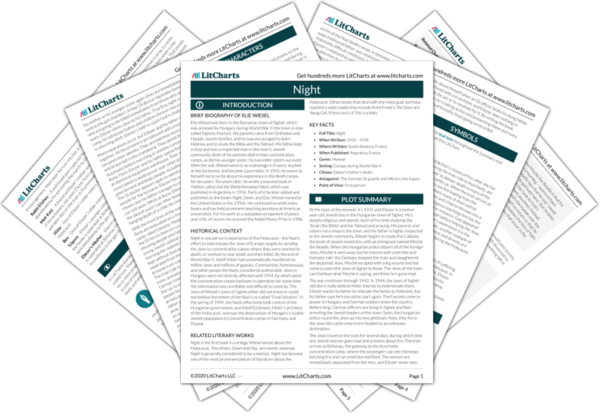Summary
Analysis
Cursed and prodded by the SS and whipped by the wind, the prisoners march. The guards yell at them to go faster and they begin to run. They hear explosions from time to time: the SS have orders to shoot anyone who can't keep up the pace.
Eliezer tries not to think, tries to keep himself moving mindlessly forward. A Polish youth who'd worked next to Eliezer in the warehouse has a stomachache. Eliezer encourages him to keep going, but the young man collapses and is trampled by those who come behind him.
Eliezer tries to become just a body focused on its own survival. The Polish youth is killed not by the Nazis but by his fellow Jews, who are all so focused on their own survival that they run right over him.
Themes
Each step with Eliezer's injured foot hurts him terribly. His father, running beside him, keeps him going. It's impossible to slow the pace because others push from behind.
Again, Eliezer's father helps him with encouragement.
Themes
They keep going until the sky starts to lighten. An officer tells them they've gone forty-two miles. They pass through a deserted village and finally are allowed to rest in the snow. Eliezer follows his father into a half-collapsed shed. People are sleeping and those sleeping begin to die. Eliezer's father won't let him sleep long. They go outside but people are dying everywhere, so they go back in the shed.
Many people are so weak from their living conditions and the insane death march that they go to sleep and simply don't wake up.
Themes
Get the entire Night LitChart as a printable PDF.

A well-loved rabbi called Rabbi Eliahou comes into the shed looking for his son, from whom he has not been separated for three years, despite them being sent to several camps. He says he was separated from his son on the road, when the rabbi had fallen behind and his son didn't notice. Eliezer says he hasn't seen the rabbi's son.
Another father-son tandem, surviving for years in the camps. But the increasingly awful brutality eventually breaks this tandem up.
Themes
Eliezer then remembers that he has seen the son deliberately abandon his father the rabbi. The son sensed that his father was near the end, and he distanced himself from the old man out of self-preservation. Even though he no longer believes in God, Eliezer prays that he doesn't do the same to his own father.
The son's abandonment of his rabbi father is a reminder to Eliezer to fight whatever impulses he might have to view his weakening father as a burden, to remember his duty as a son and never to abandon his father.
Themes
The SS soldiers get the prisoners moving again, leaving the dead where they lie in the snow. This part of the march is less orderly. The SS themselves are tired. They encourage the prisoners to keep going a few more hours. Finally they reach a new prison camp, Gleiwitz. The men are hustled into barracks, where they collapse, treading on and crushing each other. Below him in the pile, Eliezer hears the voice of Juliek, the violinist from Buna, crying for mercy. Juliek is worried his violin will be crushed. Eliezer claws at the people lying on top of him and suffocating him. He manages to claw an opening for air. He calls to his father, who is nearby and still alive. They try to sleep.
Then they hear the sound of a violin. Someone is playing part of a Beethoven concerto. Eliezer believes it is Juliek, who must somehow have managed to free himself from underneath the mass of exhausted and dying and dead people. Whenever Eliezer hears Beethoven later on in life, he thinks of Juliek.
The next morning, Eliezer sees Juliek near him, dead, his violin trampled.
The music was briefly uplifting, but the end result is the same.
Themes
The prisoners are kept at Gleiwitz without food or water for three days. They can hear gunfire and think the front might be close, but have no faith in being rescued. On the third day the weak are divided from those who can still walk okay. Eliezer's father is selected for the weak. Eliezer runs after him, the SS grab Eliezer, and in the confusion, his father slips into the unselected group, although some other people are shot.
Here Eliezer takes a risk in trying to save his father. He creates a disturbance and his father is able to get out of the group of condemned people—but the price of creating the disturbance is that other Jews are shot.
Themes
Eliezer's group is marched out of the camp to a railway, herded onto a long train of cattle cars, one hundred prisoners to a car. It is snowing heavily and the cars have no roofs. The train moves out.
On the way to Auschwitz, there were eighty people crammed into a car. Now there are a hundred people—a reflection of how emaciated they now are, as well as the Nazis increasingly brutal treatment of them..
Themes












